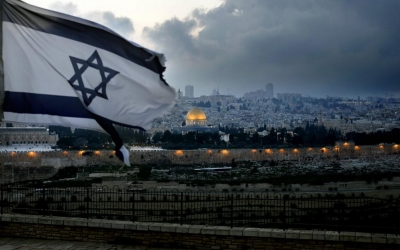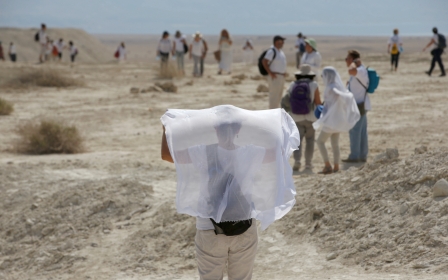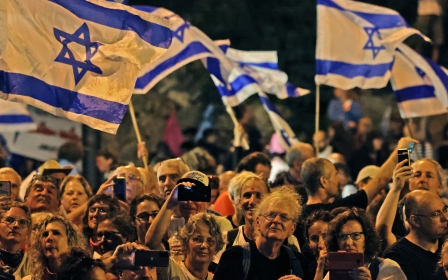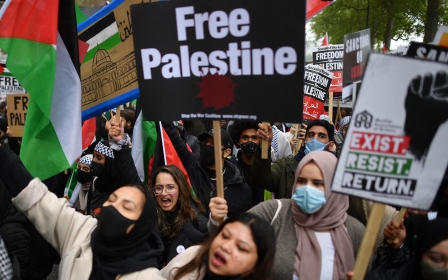Israel-Palestine: The 'victims of victims' metaphor serves no one
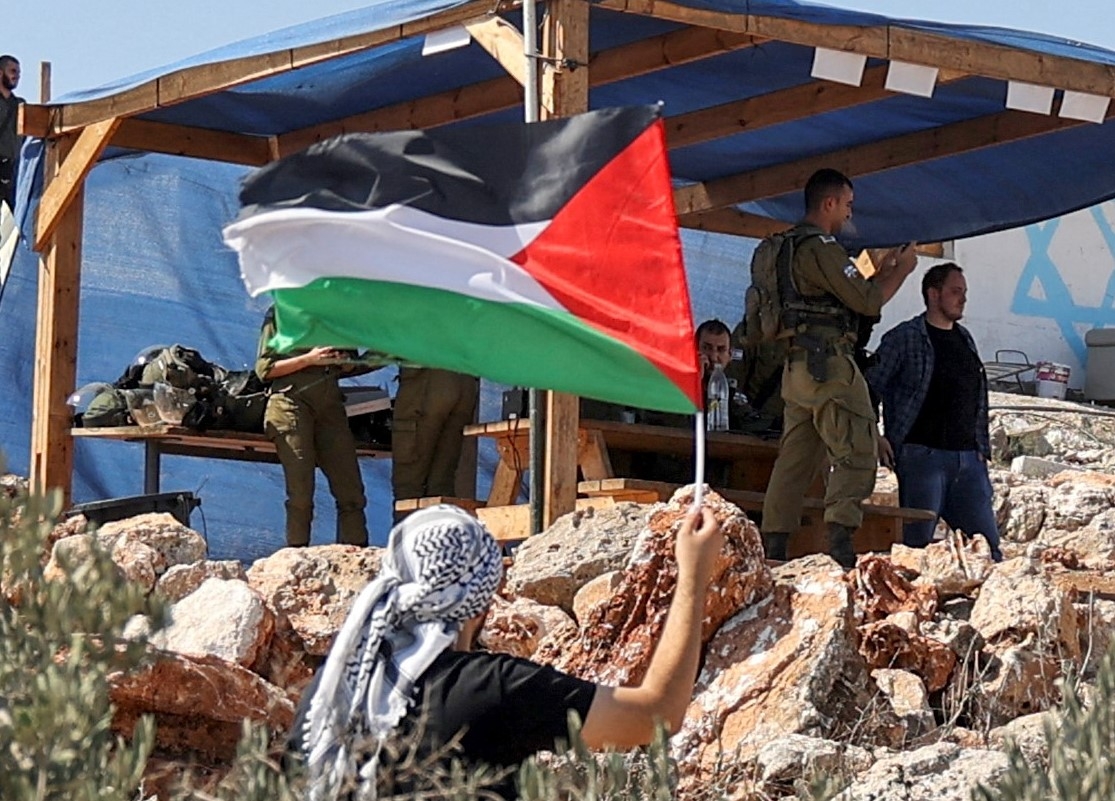
In the wake of Israel’s invasion of Lebanon in 1982, with Palestinian fighters forced to evacuate Beirut, Palestinian poet Mahmoud Darwish put his pen to paper. In the wrenching poem “Madih al-Zil al-Ali” (Praise for the High Shadow), he wrote of Israeli soldiers as “a victim that killed its own victim; I inherited its identity”.
Two decades later, during the Second Intifada, Darwish returned to the metaphor in “Halat Hisar” (State of Siege): “To a killer: If you had looked into the face of your victim and thought carefully, you might have remembered your mother in the gas chamber, and freed yourself from the rifle’s prejudice, and changed your mind. Come now, this is no way to restore an identity.”
Darwish was not alone in using this notion of Palestinians as “victims of victims”. In recent decades, other Palestinian intellectuals, most prominently Edward Said, have repeatedly employed it in their attempts to capture the essence of the Palestinian struggle with Israel. Yet as powerful as it may be, the metaphor is false - and its widespread use, among Palestinians and non-Palestinians alike, is deeply troubling on multiple fronts.
While Jews in Europe were experiencing the horrors of Nazism, a cadre of Zionists already based in Palestine were engaging in a process of colonising the land
As the comparison goes, as Jews were victims of the Nazis during the Holocaust and persecuted throughout Europe for centuries before that, Palestinians are now the victims. In a poignant tragedy, their Jewish victimisers were only recently victims themselves.
The idea behind such imagery is noble, seeking to empathise with the Israeli Jews and acknowledge their pain. Yet, it establishes a direct, if not causal, link between the Holocaust and Israel, while ignoring the history of the Zionist project, which started in the late 19th century - long before the genocide of European Jews.
Surely, some Holocaust survivors did settle in Palestine after World War II. But this does not mean that all Zionists living in Israel survived the Holocaust and were thus victims.
The founding fathers of Israel did not live in Europe during the Holocaust; most did not even live there when Hitler assumed power in Germany in 1933. While Jews in Europe were experiencing the horrors of Nazism, a cadre of Zionists already based in Palestine were engaging in a process of colonising the land, which culminated in the 1948 Nakba.
The metaphor, however, creates a perception that all Israelis were Holocaust victims.
Perception of victimhood
How was it possible that Darwish, a Palestinian, viewed the soldiers in the mighty Israeli army that destroyed Beirut as victims? The answer might lie in what seems to be the poet’s mistaken, though potent, view of all Jews as inherently victims.
Describing Palestinians as victims of victims, at its core, reduces Jews - simply by virtue of being Jewish - to the role of victim. It homogenises an otherwise heterogeneous ethnic and religious group, ignoring their widely divergent historical experiences. While this view is based on a humane understanding of Jewish tragedies and implies a rejection of antisemitic biases - which is unequivocally the right attitude - it also risks stereotyping Jews as possessing exceptional traits unique to them alone.
Jews are not monolithic. Like any religious or ethnic group, they can be victims or perpetrators, oppressors or oppressed, persecutors or persecuted. Palestinians should certainly empathise with Jewish, or any other, victims of former tragedies. But such empathy must not amount to a generalisation in which being Jewish becomes synonymous with victimhood.
Even from a Jewish standpoint, this does not do them justice as a people. As Jewish philosopher Hannah Arendt has argued, the insistence on an eternal, immutable character of Jewish victimhood falls short when it comes to recognising Jews as active agents in history. Yet, Israel has always sought to perpetuate an image of itself as a victimised, vulnerable state. It is truly astonishing to see this image being ventriloquised by members of a population that has been brutally victimised by that state.
Zionist project
Victimhood is a historical and political category. It is not an entitlement that one earns by virtue of belonging to a group, some of whose members were once victims. Jewish victims of the Holocaust cannot be translated synonymously into Jewish victims in Israel. These are two divergent historical settings, whose differences should always be observed.
Ironically, appropriating the role and voice of the victim vicariously - solely by nature of an ethnic and religious affiliation - may actually do harm to those who were actual victims, erasing their specific, historical suffering.
There are thus compelling reasons not to view all Jews as victims. One of the most serious relates to one cornerstone of the Zionist project, which seeks to conflate Zionists with Jews. When all Jews are seen inherently as victims, and if all Israeli Zionists are Jews, the conclusion is that all Israeli Zionists are also victims. This makes it essential to differentiate between the two, because that conclusion is false. Zionists and Jews are not interchangeable.
Indeed, as American scholar Judith Butler has emphasised, Jewish opposition to Zionism accompanied the birth of the movement in the late 19th century. Zionism is a nationalist movement whose identity is multilayered and cannot be reduced to Jewishness.
In employing the metaphor of “victims of victims”, Darwish appears to have cast the Israeli soldiers to whom he appeals as Jews above all else, rather than the Zionists they actually were. His failure to make that distinction suggests that he, like other Palestinians who refer to themselves as victims of victims, might have inadvertently consented to the Zionist discourse that views Zionism as speaking on behalf of the world’s entire Jewish population, overlooking the fact that there are Jews around the world who do not define themselves as Zionists. It might also reveal an unwitting internalisation of the claim of Zionist victimhood.
Colonial movement
Resistance to such logic rests on refraining from treating Zionists as synonymous with Jews. Only then can we look at Zionism for what it really is - a colonial movement - and demonstrate that the Palestinian struggle against Zionism has nothing to do with Zionists being Jews, and everything to do with them being colonialists. The conflict of Palestinians is with Zionists, not with Jews.
Framing the conflict as one between victims (Jews) and their victims (Palestinians) trivialises its colonial nature, transforming it from a case of European colonialists versus natives to one in which two victimised groups fight over the same territory. It places both Zionists, through their false equivalence with Jews, and Palestinians in the same category, appealing to the similarities between the two rather than recognising the stark differences.
To claim that these colonialists were victims is to collapse the distinction between victims and perpetrators, and to offer an affront to Palestinian suffering at the hands of Israel
Israeli Zionists are Jews; that is a given. But they are also colonialists, and their existence in historic Palestine cannot be reduced to their Jewish identity.
Palestinians are not victims of victims. They are victims of European colonialists who destroyed their communities, stole their land, and forcibly expelled a large number of them from Palestine. The Zionist paramilitaries, such as the Irgun and the Haganah, that participated in the ethnic cleansing of Palestine were not victims. Former Israeli Prime Minister David Ben-Gurion and his ilk were also not victims.
To claim that these colonialists were victims is to collapse the distinction between victims and perpetrators, and to offer an affront to Palestinian suffering at the hands of Israel. While Palestinians do need to narrate their tragedy through certain metaphors, “victims of victims” is certainly not an accurate, appropriate or moral one.
The views expressed in this article belong to the author and do not necessarily reflect the editorial policy of Middle East Eye.
Middle East Eye propose une couverture et une analyse indépendantes et incomparables du Moyen-Orient, de l’Afrique du Nord et d’autres régions du monde. Pour en savoir plus sur la reprise de ce contenu et les frais qui s’appliquent, veuillez remplir ce formulaire [en anglais]. Pour en savoir plus sur MEE, cliquez ici [en anglais].




